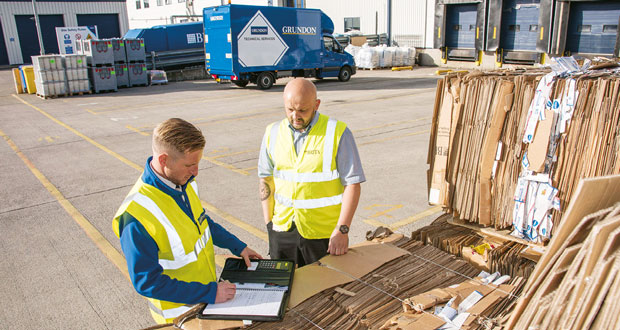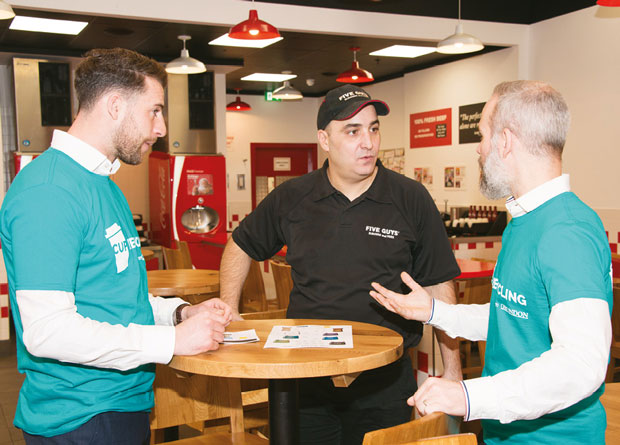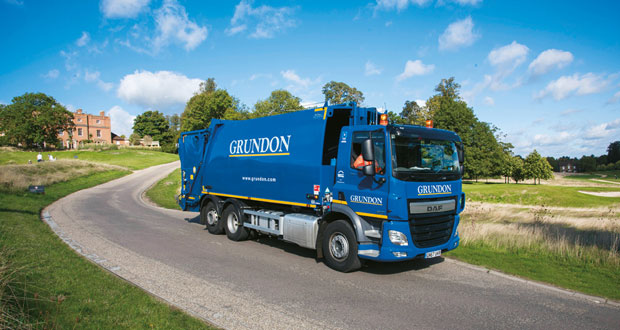ENGAGEMENT CHALLENGE
For the second year in a row, lack of senior management support/understanding of waste management issues comes in at the number three slot. To help demonstrate the importance of good waste management, the Grundon team often invites customers to look round its treatment facilities and Yarrow says: “We find that when businesses come and see our level of investment and how technology is used to manage and treat their waste, it makes a real difference.
“Once they can see what happens to their waste it really hits home and then they become the hands and eyes on the ground back in the workplace. If they see an employee putting a plastic bottle in a general waste bin instead of recycling it, they will pull people up because they have seen for themselves how much better it is for that bottle to be recycled rather than sent to Energy from Waste.
“It’s also really important to provide the monthly recycling statistics and reports to senior management teams to show where we are making a difference, this helps them understand the benefits, both financially and environmentally, as it goes to their own sustainability credentials.”
According to the survey results, an increased number of FMs see improving waste and recycling as both a challenge and a headache – up from previous years – while the number who see it as an opportunity is dropping.
Countering this viewpoint is Ross Crook, Environmental Services Manager at Lakeside Shopping Centre in Thurrock, Essex, home to over 200 shops and some 40+ food and beverage outlets. In September last year Grundon took over provision of waste management services at Lakeside and Crook says what has been most eye-opening is the sheer volume of sustainability opportunities that have opened up as a result.
“We knew previously that we wanted to change the way we managed waste on site but at the same time, there was always a little voice saying ‘is this the right thing to do’,” said Crook.
“What we’re realising is that, especially on a site of this size, the opportunities for recycling and reusing what we have here are endless – not everything has to go in a bin, there are so many other options available.”
Lakeside has also benefited from achieving rebates, something that resonates as an increasing number of respondents (14 per cent) are now appreciating the opportunities to gain rebates on reprocessing and recycling.
In the first six months of its new contract, Lakeside achieved rebates of over £24,000 on cardboard recycling alone and further rebates may be achieved as there are also plans to bale and reprocess polythene and plastic coat-hangers. In addition, the introduction of a segregated food waste service is also expected to deliver costs savings.
Because food waste is traditionally very heavy, if disposed of in general waste bins it not only makes the bins heavier to move, but also increases the cost of disposal because collection fees are based on weight.
Taking out the food element reduces the cost of general waste disposal – which is generally five times more expensive than disposing of segregated food waste – and provides a much more sustainable approach. If correctly segregated, food waste can be sent to Anaerobic Digestion facilities where it produces renewable energy and a nutrient-rich biofertiliser.
Crook adds: “We already knew we wanted to tackle food waste as it is likely to make the biggest difference to our overall recycling rates and costs.
“Because we have so many different types of food outlets it’s easy to think that it may only be three or four bags of food waste per small unit, but when you add that up with all the other food retailers too, it becomes a lot.”
While the majority of FM respondents said a good waste management service would deliver improved environmental credentials, an almost equal number (23.8 per cent v 23.1 per cent) said it would save money or cost more money – showing there is still an uncertainty amongst FMs about the best approach.
On the plus side, the number of people who believe a good waste management service won’t make a difference has more than halved in five years.
The number of FMs who said they had waste management strategies with clear environmental targets was over 50 per cent for the second year running, although the number who still hadn’t set targets had risen by nearly 10 per cent, showing there is still a need for greater forward planning. Those without a waste management strategy dropped to its lowest ever, at 7.5 per cent.
Yarrow concluded: “Every year the survey shows us that incremental steps are being taken to improve waste management and it’s encouraging to see FMs are asking more questions about transparency and environmental goals.
“We know from the results customers such as Lakeside that good waste management practice can deliver real, tangible results to both the bottom line and to sustainability goals.
“Working together with FMs is the key to success and we continue to give them every possible support to get those recycling statistics higher than ever and introduce new measures which help them to reach those important environmental targets in years to come.”







